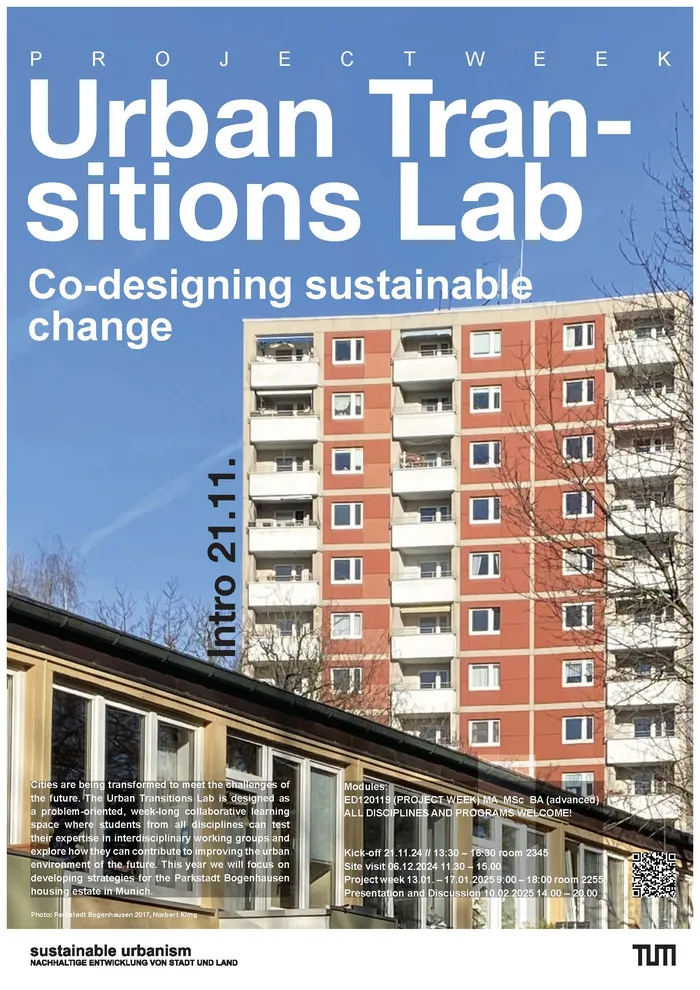Project Week || Urban Transitions Lab. Co-Designing Sustainable Change
Interdisciplinary Course
PROJECT WEEK [ED120119] | WINTER 2024/25 I MA | MSc I BACHELOR ADVANCED | ALL DISCIPLINES AND PROGRAMS WELCOME!
(Letzte Aktualisierung: 09.08.2024)

Cities are being transformed to meet the challenges of the future. The Urban Transitions Lab is designed as a problem-oriented, week-long collaborative learning space where students from all disciplines can test their expertise in interdisciplinary working groups and explore how they can contribute to improving the urban environment of the future. This year we will focus on developing strategies for the Parkstadt Bogenhausen housing estate in Munich.
In response to the tendency of sectoral thinking in urban practice and the general lack of opportunities for interdisciplinarity in the regular curriculum of many courses, we aim to introduce a project week in the form of an exploratory design sprint. This structure will enable students to collaborate in multidisciplinary teams, follow their personal and group interests, engage in the discussion on urban transformation, and apply their expertise to real-world scenarios.
This project focuses on the transformation of large residential and mixed-use complexes organized as condominiums under the WEG (Wohnungseigentumsgesetz). These complexes offer significant potential for implementing policies related to the European Union's Green Deal, climate adaptation, new forms of mobility, and urban biodiversity. They are potential sites for a wide range of privately-led transformations, collective space appropriation, and bottom-up initiatives that contribute to the diversity of urban life. At the same time, they exhibit certain characteristics that inhibit far reaching changes to its physical structure and urban layout (Kling 2020).
While the transformation of housing estates owned by councils and single housing providers has been the focus of policy-making and innovative approaches, housing estates organized as condominiums are much less understood and researched. Here, a multitude of different individual desires, approaches, and abilities often lead to a deadlock situation, where despite an overall commitment to SDG-oriented transformation, very few projects and initiatives can be realized.
Participants in the Urban Transitions Lab will explore this kind of complex stakeholder set-up and develop context-sensitive transformation strategies and sets of recommendations for a specific case in Munich. During the project week they will explore and apply different methods of urban analysis, speculative thinking, critical reflection and co-design to address the multiple dimensions of urban change.
The Urban Transitions Lab will conclude with a presentation to representatives from academia and urban practice, who will discuss the projects with the student groups.
The collaborative work and results will be documented in an annotated compendium to inform further work and serve as a future reference within interdisciplinary research labs and seminaries of the Chair of Sustainable Urbanism.
Exam: The module examination takes the form of a presented and submitted project work.
The project work is assessed as a whole. It consists of the following elements: (1) project work submission (depending on the project: compendium of site information and useful data, analytical sketches, concept sketches, graphical representations of scenarios, strong visualisations of strategies that speak to an audience, explanatory text and diagrams, used references), (2) oral presentation, and (3) written component.
Exam Format: Submitted project work (70%), oral presentation (15%), written component (15%)
Coordination: Dr.-Ing. Norbert Kling, n.kling(at)tum.de, TUM School of Engineering and Design
Teaching: Norbert Kling, Laura Maria Höpfner, Prof. Mark Michaeli, and visiting guests.
Language: English
Schedule:
Introduction 21.11.2024 // 13:30-17:00 // Room 2345 (Venture Lab)
Site visit 06.12.2024 // 11.30-15:00
Project Week 13.01.-17.01.2025 // 2255
Examination 10.02.2024 // 14.00-20.00 // Room 5166 (tbc) // Presentation and discussion
Working mode Interdisciplinary, mixed groups
Participants have some flexibility to accommodate their individual schedules.
TUM Project Weeks https://www.tum.de/en/studies/degree-programs/key-skill-programs/project-weeks
—----------------------------------------------------------------------------------------------------------------
References:
Giseke, Undine. Löw, Martina. Million, Angela. Misselwitz, Phillipp and Stollmann, Jörg (2021) Urban Design Methods. Berlin.
Kling, Norbert (2020) The Redundant City. A Multi-site Enquiry into Urban Narratives of Conflict and Change. Transcript: Bielefeld, pp. 204–222, https://www.transcript-publishing.com/978-3-8376-5114-0/the-redundant-city/?number=978-3-8376-5114-0
Kling, Norbert (2023) Linking Situational Analysis to Architecture and Urbanism. An Interdisciplinary Perspective. Forum Qualitative Sozialforschung Forum: Qualitative Social Research, 24(2). https://doi.org/10.17169/fqs-24.2.4084
Umweltbundesamt (German Environment Agency) (2023) Triple Inner Urban Development. Definition, Tasks and Opportunities for an Environmentally Oriented Urban Development. Dessau. https://www.umweltbundesamt.de/sites/default/files/medien/1410/publikationen/uba_hg_dreifacheinnenentwicklung_engl_bf.pdf